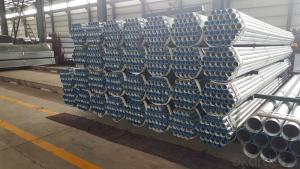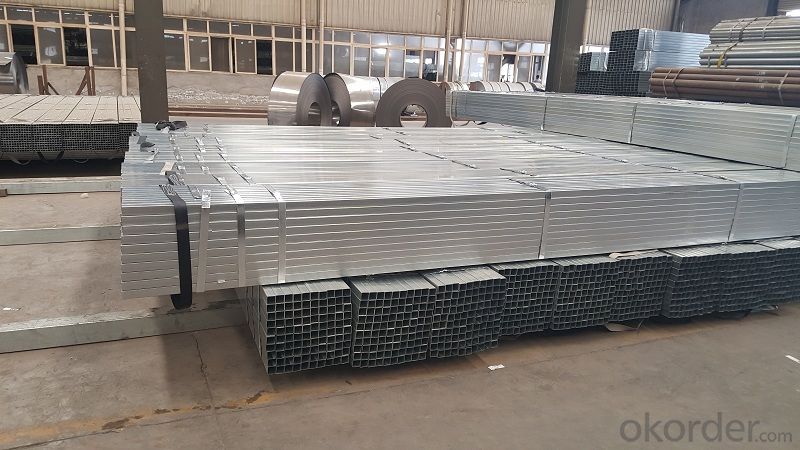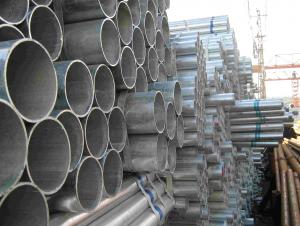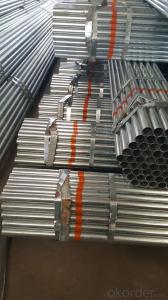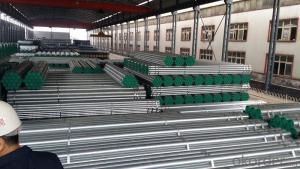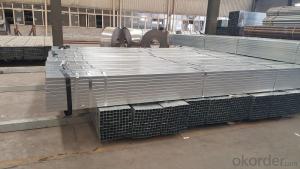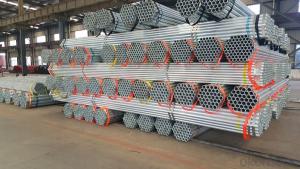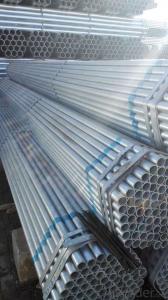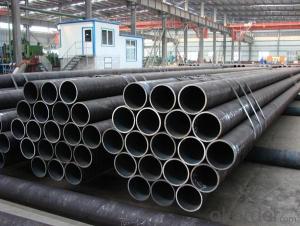Galvanized welded steel tubes for equipment
- Loading Port:
- Tianjin
- Payment Terms:
- TT OR LC
- Min Order Qty:
- 10 m.t.
- Supply Capability:
- 20000 m.t./month
OKorder Service Pledge
OKorder Financial Service
You Might Also Like
Specification
1、Structure of Galvanized welded steel pipe for materials :
The surface of galvanized steel pipe welded steel pipe of hot dip galvanized layer or. Galvanized can increase the corrosion resistance of the steel tube, prolong service life. Galvanized pipe is widely used, in addition to water, gas, oil and other general low pressure fluid pipelines. It is also used in the petroleum industry, especially for offshore oil field of oil well pipe and oil pipe, chemical, coking equipment of oil heater, condensation cooler, coal run oil exchanger tube, and trestle pile, the mine tunnel support frame tube.
2、Main Features of Galvanized welded steel pipe for building materials :
• High manufacturing accuracy
• High strength
• Good visual effect
• Reasonable price
3、 Galvanized welded steel pipe for building materials Specification:
Standard | GB, DIN, ASTM ASTM A106-2006, ASTM A53-2007 |
Grade | 10#-45#, 16Mn 10#, 20#, 45#, 16Mn |
Thickness | 1 - 33 mm |
Section Shape | Round |
Outer Diameter | 21 - 610mm |
Place of Origin | Tianjin, China (Mainland) |
Secondary Or Not | Non-secondary |
Application | Hydraulic Pipe |
Technique | Cold Drawn |
Certification | API |
Surface Treatment | factory state or painted black |
Special Pipe | API Pipe |
Alloy Or Not | Non-alloy |
Length | 5-12M |
Outer Diameter | 21.3-610mm |
Grade | 20#, 45#, Q345, API J55, API K55, API L80, API N80, API P110, A53B |
Standard | ASME, ASTM |
1) Material:Q195 Q235 Q345 X42 X52
2) Specification range:OD:21.3-610mm,WT:6-70mm,length:6-12m or according to the requirement of clients.
3) Excutive standards:GB,ASME API5L.ASTM A 106/A53,Despite of the above standards,we can also supply seamless steel pipe with standard of DIN,JIS,and so on,and also develop new products according to the requirements
4、Packaging & Delivery
Packaging Details: | seaworthy package,bundles wrapped with strong steel strip |
Delivery Detail: | 15-30days after received 30%TT |
5、FAQ of Galvanized welded steel pipe for building materials :
①How is the quality of your products?
Our products are manufactured strictly according to national and internaional standard, and we take a test
on every pipe before delivered out. If you want see our quality certifications and all kinds of testing report, please just ask us for it.
Guaranteed: If products’ quality don’t accord to discription as we give or the promise before you place order, we promise 100% refund.
②How about price?
Yes, we are factory and be able to give you lowest price below market one, and we have a policy that “ for saving time and absolutely honest business attitude, we quote as lowest as possible for any customer, and discount can be given according to quantity”,if you like bargain and factory price is not low enough as you think, just don’t waste your time.Please trust the quotation we would give you, it is professional one.
6、 Galvanized welded steel pipe for building materials Images:
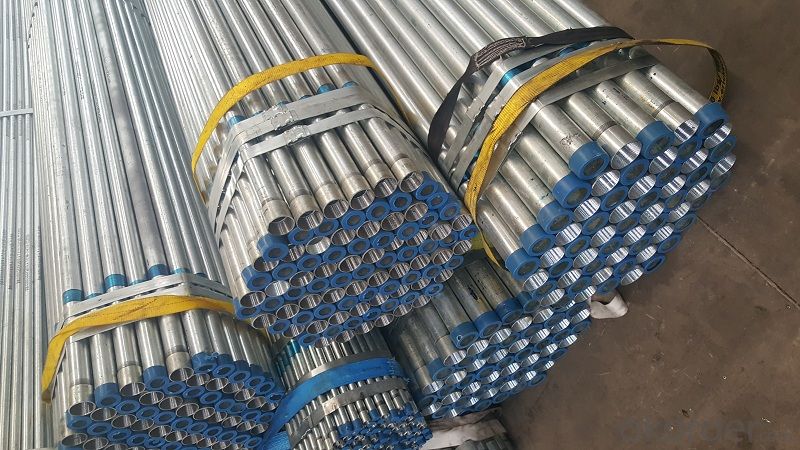
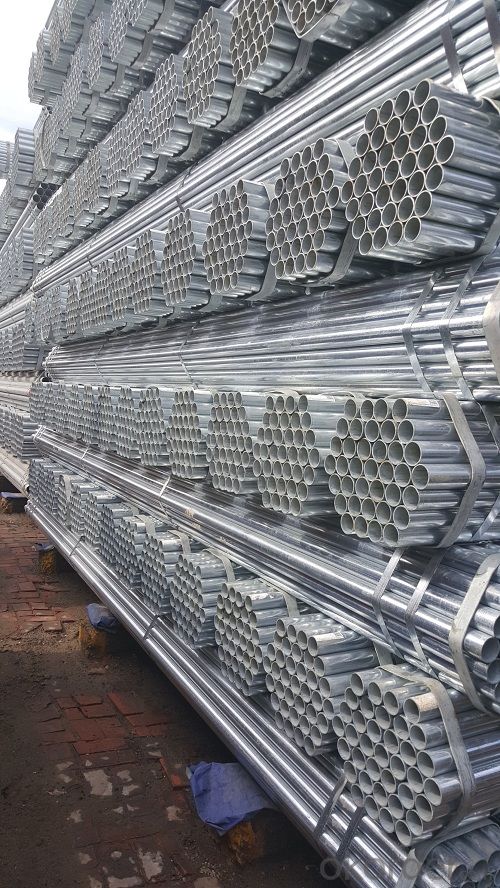
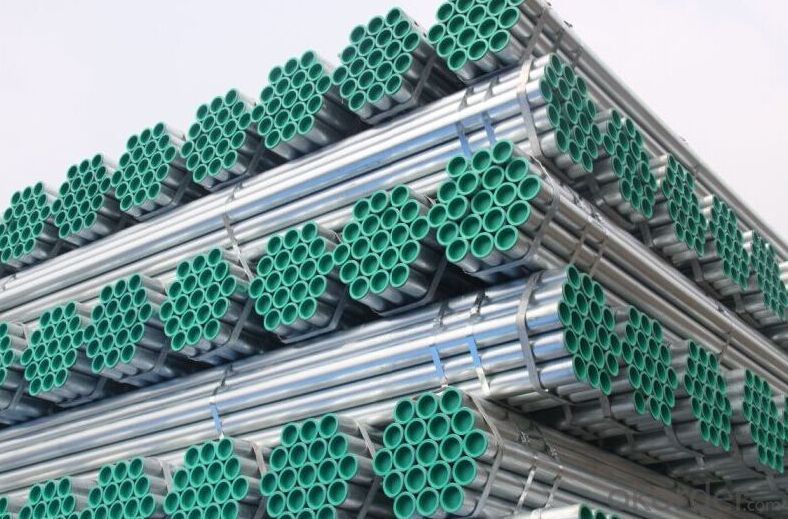
- Q: What are the common applications of steel pipes in the oil and gas industry?
- Steel pipes are commonly used in the oil and gas industry for various applications such as drilling, transportation of crude oil and natural gas, and for constructing pipelines and storage tanks. They provide strength, durability, and resistance to corrosion, making them ideal for these critical operations.
- Q: What are the safety considerations when working with steel pipes?
- There are several crucial safety considerations to bear in mind when working with steel pipes. To begin with, it is imperative to wear the appropriate personal protective equipment (PPE). This includes safety glasses or goggles to shield the eyes from debris or sparks, gloves to protect the hands from sharp edges or hot surfaces, and steel-toed boots to safeguard the feet from falling objects or heavy equipment. Additionally, it is advisable to wear a hard hat to shield the head from potential falling objects or hazards overhead. Moreover, one must be mindful of the weight and size of the steel pipes. Handling heavy pipes can strain the back and muscles, so it is essential to utilize proper lifting techniques and seek assistance when necessary. The use of lifting equipment, such as cranes or forklifts, can also help prevent injuries associated with heavy lifting. Another safety consideration is the risk of cuts or punctures. Steel pipes may have sharp edges or burrs, so it is important to handle them with care and wear suitable gloves to minimize the risk of injury. It is also recommended to inspect pipes for any defects or sharp edges before working with them. Furthermore, working with steel pipes may involve welding or cutting, which can generate sparks, heat, and fumes. It is vital to work in a well-ventilated area or employ proper ventilation equipment to ensure the elimination of harmful gases or fumes. Fire safety precautions, such as having fire extinguishers nearby and adhering to proper procedures for hot work, should also be taken. Lastly, one must be aware of potential hazards associated with working at heights or in confined spaces. When working on elevated platforms or scaffolding, fall protection measures, like safety harnesses or guardrails, should be in place. In confined spaces, proper ventilation and monitoring for hazardous gases are essential to prevent asphyxiation or exposure to toxic substances. By adhering to these safety considerations and following proper procedures, the risk of accidents or injuries when working with steel pipes can be significantly reduced.
- Q: How are steel pipes insulated for thermal purposes?
- Steel pipes are insulated for thermal purposes by wrapping them with insulating materials such as mineral wool, fiberglass, or foam. These insulating materials help to prevent heat transfer between the pipe and its surroundings, minimizing energy loss and maintaining the desired temperature inside the pipe. Additionally, a protective outer layer or jacket is often applied to enhance the insulation's durability and protect it from external elements.
- Q: What is the difference between steel pipes and copper pipes?
- Steel pipes and copper pipes differ in terms of their material composition, with steel pipes being made of steel and copper pipes being made of copper. Steel pipes are generally stronger and more durable, making them suitable for high-pressure applications and underground installations. Copper pipes, on the other hand, have excellent heat conductivity and corrosion resistance, making them ideal for plumbing and heating systems. Additionally, copper pipes are more expensive than steel pipes but offer better resistance to bacteria growth. Ultimately, the choice between steel and copper pipes depends on the specific needs and requirements of the application.
- Q: How are steel pipes used in the manufacturing of structural frameworks?
- Steel pipes are commonly used in the manufacturing of structural frameworks due to their strength, durability, and versatility. They provide a reliable means of connecting and supporting various components, allowing for the creation of robust and stable structures. Steel pipes are often used as columns, beams, and braces, providing essential support and stability to buildings, bridges, and other infrastructure projects. Additionally, steel pipes can be easily customized and fabricated to meet specific design requirements, making them a popular choice in the construction industry.
- Q: What are the different types of flanges used with steel pipes?
- There are several types of flanges commonly used with steel pipes, including slip-on flanges, weld neck flanges, socket weld flanges, threaded flanges, and blind flanges. These flanges are used to connect and secure steel pipes in various industrial applications, each offering specific advantages depending on the requirements of the piping system.
- Q: Are steel pipes suitable for chemical processing plants?
- Due to their exceptional strength, durability, and corrosion resistance, steel pipes find common usage in chemical processing plants. Particularly, stainless steel or alloy steel pipes possess the ability to endure high temperatures, pressure, and the corrosive impact of various chemicals. Consequently, they serve as a suitable means for the safe and efficient transportation and containment of diverse chemical substances. Moreover, the installation, maintenance, and repair of steel pipes are hassle-free, rendering them a cost-effective option for chemical processing plants. Nonetheless, it remains crucial to carefully select the appropriate steel type, taking into account factors such as the specific chemicals being processed, operating conditions, and any potential risks or compatibility issues. Regular inspections and maintenance are also vital for ensuring the integrity and performance of steel pipes in chemical processing plants.
- Q: What are the future trends in steel pipe manufacturing?
- Some future trends in steel pipe manufacturing include the adoption of advanced technologies such as automation and robotics, the development of high-performance and sustainable materials, the implementation of efficient and eco-friendly production processes, and the integration of digitalization and data analytics for improved quality control and supply chain management. Additionally, there is a growing focus on the development of specialized pipes for specific industries such as oil and gas, construction, and automotive, as well as an increased emphasis on product customization and tailored solutions to meet the evolving needs of customers.
- Q: Can steel pipes be used for high-pressure applications?
- Yes, steel pipes can be used for high-pressure applications. Steel is known for its strength and resilience, making it a suitable material for handling high-pressure fluids or gases. Additionally, steel pipes can withstand extreme temperatures and are resistant to corrosion, further enhancing their suitability for high-pressure applications.
- Q: What are the different grades of steel used in manufacturing pipes?
- The different grades of steel used in manufacturing pipes are typically categorized based on their chemical composition and mechanical properties. Some common grades include carbon steel, stainless steel, alloy steel, and duplex steel. Each grade has its own unique characteristics and is chosen based on the specific requirements of the application, such as corrosion resistance, strength, and temperature resistance.
Send your message to us
Galvanized welded steel tubes for equipment
- Loading Port:
- Tianjin
- Payment Terms:
- TT OR LC
- Min Order Qty:
- 10 m.t.
- Supply Capability:
- 20000 m.t./month
OKorder Service Pledge
OKorder Financial Service
Similar products
Hot products
Hot Searches
Related keywords
